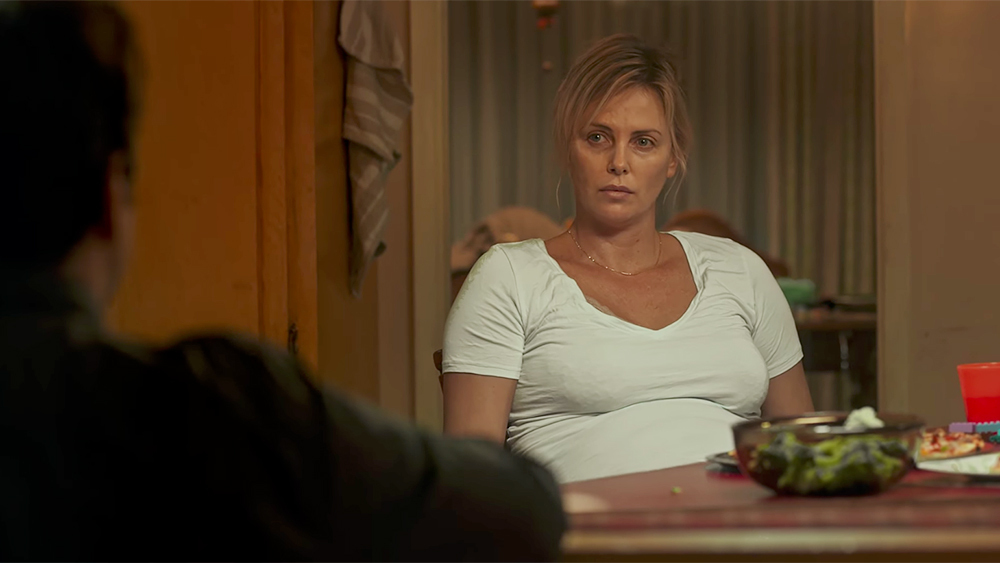Blueprints: "Tully"
 Thursday, May 10, 2018 at 11:45PM
Thursday, May 10, 2018 at 11:45PM For this upcoming Mother’s Day weekend, Jorge takes a look at the depictions of the hardships of motherhood in Diablo Cody and Jason’s Reitman’s latest joint.

At this point it may be an overstatement, but motherhood is not easy. As it turns out, taking care of another, much smaller living and breathing human being requires more time, attention and energy than one sole human being is able to provide. Tully, among many other things, is an examination of the mental toll that motherhood takes on a person.
Let’s take a look at the tools that Diablo Cody’s script uses to portray the everyday hassle, tediousness and exhaustion that Charlize Theron’s Marlo has to endure, before Tully comes in and rescues her...
Tully
Written by: Diablo Cody
A montage is a well-known, widely utilized cinematic device that is used to show the passage of time. It is usually put in the context of a character going through significant changes. A training montage will make someone improve a particular skill. A makeover will turn someone better looking, and a shopping montage will give them arguably more fashionable clothes.
But in Tully, Diablo Cody uses montages to show how things can also remain exactly the same. Marlo’s life has been consumed by a spiral of routine and diaper changes since she gave birth for the third time. The script lays it out explicitly for us: “We see a MONTAGE of endless, grinding, exhausting DAYS and NIGHTS of baby care. We never leave the living room. Marlo sleeps on the couch with a blanket and pillow-- when she gets to sleep.”
It is not a long, detailed description of every small scene that will make up the montage. The point of it is to show how redundant Marlo’s life is, and how all of her days blend together with one another. Later on, we are told that her clothes may be slightly different, but they are basically “all the same variation on T-shirt and sweat pants.”
And as a way of reflecting (and, in a way, foreshadowing) how fragile Marlo’s mental state is, the script jumps back and forth between her grinding reality and the stress hallucinations that exhaustion is giving her; separated by the use of italics.

***

However, Cody does use a second montage later in the script to say that just because things are steady, it doesn’t mean they’re necessarily bad. After Tully has been introduced into Marlo’s life, she starts to see a significant change in her life and routine. The script warns us “We begin a MONTAGE, so positive in tone it’s nearly ridiculous.” The music playing over it has to be “some happy shit.”
The diapers, stress dreams, and sweatpants have given place to baking, laughing, and explicitly different outfits in different nights. There is clarity and differentiation between the days. Marlo’s mental state is clearly reflected on how she experiences the passage of time.

***

Tully is about many things, not just the difficulties of motherhood; although arguably all of its themes stem from that statement. And its script dives into the many sides and nuances of Marlo’s experience. But Diablo Cody does what she knows best, and finds clever and visually resonant ways to reflect her character’s psyche on their actions. Even if that action is changing a diaper. Over, and over, and over again.
 Blueprints,
Blueprints,  Diablo Cody,
Diablo Cody,  Original Screenplay,
Original Screenplay,  Tully
Tully 


Reader Comments (1)
"Tully " is an excellent movie. I don't know why there isn't more general enthusiasm for it.
You are so right about the montage being used in an interesting way here. Sometimes when I'm in situations where kids are screaming, I console myself with the thought, "When I get home, YOU won't be there". But in the montage, you're stuck there.
"Tully" is the kind of movie that simmers in the back of your mind for a long time. One thing I find odd is the assumption of some reviewers that Marlo not accepting help is part of her personal psychological profile. But really, for most of us, there is no help to be had.
It reminds me of "Why didn't she break the glass ceiling? It must have been her own choice, part of her personal psychology". "Why do you put up with that at work? If you continue to put up with it, it must be your own choice." In 98% of family counselling, it's the mom who gets more work to do, not the other family members. I think the moms would prefer it if other family members pulled some weight, but most often they do not. And the counsellors don't ask them to, either because they know it's not going to happen, or they don't think that's "their job".
In the movie, when the husband complains that Marlo left the kids alone, the doctor says, they weren't alone, they were with you.
And sorry, I guess that's a long-winded way of saying that maybe audience's enthusiasm is lessened by distancing themselves, thinking "Marlo chooses this" rather than thinking this is a systemic problem in our society. Overly vehement because I've been there.